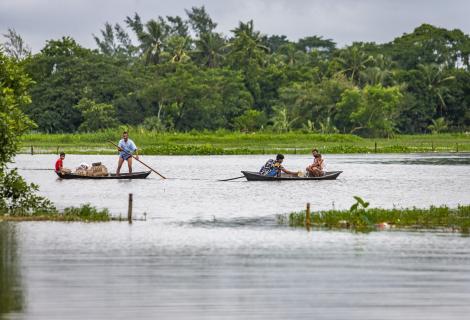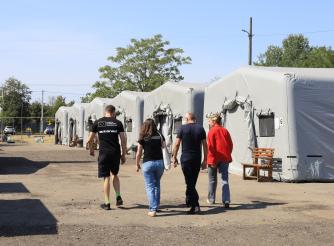‘I couldn’t carry my son who has physical disabilities, so I left him behind hoping he’ll be safe’: Families in Bangladesh forced to flee homes as floods wreak havoc

Families, who have lost everything in the ongoing Bangladesh flooding, are reliving painful memories of the day the floodwaters came gushing into their homes, forcing them to leave all they had.
They are now living in flood shelters, surviving on the scarce drinking water and food available as roads have been cut off, hampering aid delivery efforts.
Shukuri Begum, 56, a resident of Shonaimuri Upazilla in Noakhali, one of the worst-hit districts, recalls:
"This flood took away my home - it sank into the pond. We were terrified and fled to a neighbour’s house with my grandchildren. But we couldn’t stay there long; it wasn’t safe anymore. We came here by boat to find shelter. I have a son with physical disabilities, and we couldn’t bring him with us. We had to stack beds and leave him on top, hoping he would be safe. I don’t know what’s waiting for us."
Over 800,000 families are currently living in waterlogged areas, with nearly 200,000 people seeking refuge in flood shelters. Schools in some regions have been converted into flood shelters for the affected families.
Nazrul Islam, Bondattor village, Kabirhat, Noakhali District, says: "My family and I are in deep trouble. At first, the floodwater reached our waists, and as it rose to our chests, we had no choice but to leave our home and everything behind. Now, we’re in this shelter with my children, and I have no idea what’s happened to our house. I don’t even know if anything will be left when we can finally return. Everything is destroyed. Please, help us."
ActionAid Bangladesh, together with its local partners, are already supporting the affected communities in Sadar and Sonaimuri areas of Noakhali District and will start responding in Feni District as soon as the water levels recede.
Through a youth-led initiative, families in the flood shelters have received cooked food and other emergency supplies such as oral rehydration solution (ORS), emergency medicine, water purification tablets and dignity kits. ActionAid is also providing psychosocial first aid support for the displaced families, alongside distribution of dignity kits.
"We have divided ourselves into teams, so that we can gather information from hard-to-reach areas and enable our youth volunteers to provide food relief to people who are in the waterlogged and most remote parts of Noakhali.
But, we are facing challenges because the large boats cannot reach these areas, so we are using small boats to carry food and other relief materials. We need more volunteers to support the flood-impacted people with food relief, as they are in a dire situation," says Nahida Sultana Etu, a youth volunteer with ActionAid Activista.
The floods come at a time when Bangladesh is still recovering from Cyclone Remal, which hit just three months ago - the most devastating cyclone to strike the country in recent years. With the impacts of the climate crisis being ever more intense, Bangladesh has been on the receiving end.
Farah Kabir, the country director of ActionAid Bangladesh, says:
“Countries like Bangladesh with negligible emissions and whose people have shown super resilience deserve immediate funds to address the impacts of climate change and frequent disasters. We need to recover from the losses and damage we have faced as well as build resilience to future impacts and take on green development pathways."
Contact the ActionAid press office on media-enquiries@actionaid.org or on +263 776665065 (Calls and WhatsApp).


